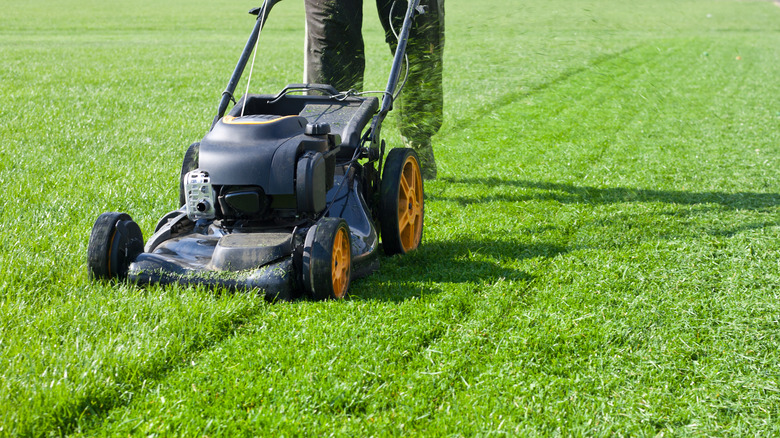How Do Self-Propelled Lawn Mowers Work And Are They Worth Buying?
If you want to make mowing the lawn feel less like a chore, you may want to consider purchasing a self-propelled lawn mower over the regular push-powered style. For some, it will help cut your mowing time in half, but for others it might not be worth the financial investment. But before you ask yourself if a self-propelled lawn mower is the right choice, you should also understand how they work.
Many retailers like Home Depot offer myriad tools for staying on top of your yard, including electric lawn mowers. On top of that, brands like EGO are offering electric lawn mowers with self-propelled technology. There are a lot of benefits for owners of self-propelled lawn mowers to enjoy, but they aren't for everyone.
Choosing the right lawn mower type depends on many circumstances, such as the type of your lawn and how much you're willing to spend. Assessing these factors, you'll be able to determine whether a self-propelled mower is a worthless investment or a tool that will take your yard to the next level. Let's explore how self-propelled lawn mowers work, who might benefit from them, and whether they're worth your money.
How do self-propelled lawn mowers work?
Unlike push lawn mowers, self-propelled mowers require little manual effort to operate. By squeezing a bar, you'll activate the motor of the lawn mower, removing the need to push the mower. This is made possible thanks to a built-in drive shaft that connects the wheels to the motor, similar to the mechanics of a car's driving system. When letting go of the bar, the mower will be stopped, acting as an essential safety feature.
Due to their automatic motorized technology, self-propelled lawn mowers are ideal for larger lawns. To compensate for larger areas, some brands offer varying mower speeds, allowing you to mow your lawn more efficiently. Self-propelled mowers also come in different driving types, including all-wheel, front-wheel, and rear-wheel drive. Front-wheel drive mowers are best for mowing flat lawns as they require a little more physical work. On the other hand, rear-wheel drive mowers are the most popular type that require less force to operate. This makes them ideal for mowing sloped or uneven lawns. For extra convenience, self-propelled mowers often contain collection bags or a side discharge, depending on how you wish to process your trimmings.
Is it worth getting a self-propelled lawn mower?
Due to their automatic propulsion, self-propelled lawn mowers are a great option to reduce strain while mowing — perfect for uneven or challenging lawns. They are especially a good choice if you struggle mowing uphill with a push mower. They also offer improved efficiency for mowing large areas thanks to the little force they require. But before buying one, self-propelled mowers aren't made for all gardeners, so it's important to assess whether you actually need one.
First and foremost, if you have a small lawn, there are plenty of push mowers perfect for small yards that will do a good job. Consumer Reports recommends anyone with a yard size above half an acre to invest in a self-propelled mower.
Another factor to consider is the tradeoff between cost and efficiency. Self-propelled mowers are typically more expensive, so if it's not going to make much of a difference, you're better off sticking with a push lawn mower. Lastly, if your lawn is uneven or sloping, using a push mower can be extremely difficult. A self-propelled mower provides good traction with little force to operate, so you can tackle the most challenging of lawns.


